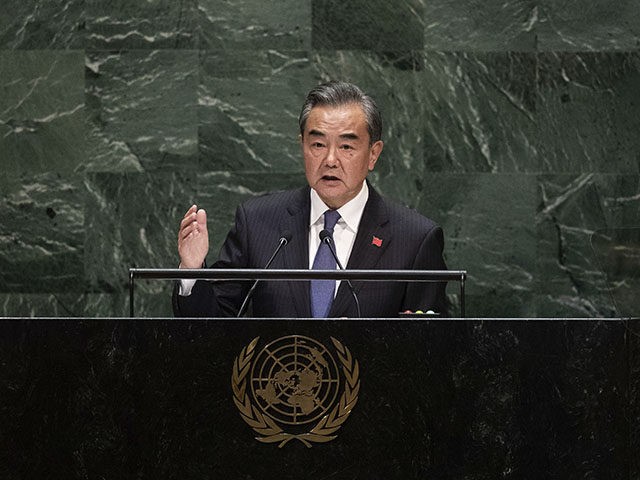Chinese Foreign Minister Wang Yi insisted Monday that China’s Belt and Road Initiative (BRI), an international infrastructure program criticized as debt-fueled imperialism by the U.S. government, is doing better than ever after the coronavirus pandemic.
Wang claimed China has more money than ever to spend on the program, despite rumors of impending cuts to BRI funding because of domestic economic concerns.
“Many projects have kept running without laying off employees during the Covid-19 [Chinese coronavirus] pandemic on the premise of strictly controlling the epidemic situation. A number of new projects have been launched,” Wang said at the annual Belt and Road Forum for International Cooperation in Beijing.
“No matter how the global situation changes, neither the international community’s demand, nor the partners’ support for it, has changed. China’s determination to promote international cooperation has not changed,” he said.
Wang said China’s investment in BRI has “not dropped” during the global recession caused by the Wuhan coronavirus, but has “shown a contrary trend of growth,” increasing by 30 percent in 2020 to reach over $30 billion in September.
The South China Morning Post (SCMP) reported in late December that doubts were growing among analysts as to whether China could continue funding new BRI projects, or even maintain the financing on existing projects. Chinese corporate debt is mounting, especially among corporations doing business in the Third World, where most of BRI’s tentacles reach, while China’s total national debt rose from 255 percent of GDP to 290 percent, and the financial situations of China’s partner nations looked even direr.
“China will need to be more selective in the projects it can finance, especially in emerging economies. Countries in the midst of major infrastructure projects, and also indebted due to them, may no longer find the resources available to continue with these projects,” Asia-Pacific economist Alicia Garcia-Herrero of the French financial firm Natixis said in November, rendering the judgment Wang appeared to be responding to on Monday.
Other analysts suggested China would have to reduce funding for “unsustainable” BRI projects, an oblique reference to the fact that many of the biggest Belt and Road projects do not generate enough revenue to repay the loans taken out from Chinese banks to finance them.
Critics of the program say these projects are deliberately unsustainable because China wants to get developing nations hooked on huge loans they can never repay, eventually offering Beijing control of valuable national assets to satisfy their crushing debts. Skeptical analysts denounce these tactics as “debt-trap diplomacy” or “debt imperialism.”
Wang also said Monday that China will make development of the “Digital Silk Road” — the Internet component of BRI, which in turn was named after the Silk Road trade route of ancient times — a high priority in the year to come.
This is grim news for Western defense and cybersecurity analysts, who warn China is strengthening its grip on the Internet by providing hardware and software infrastructure to developing nations, even as developed countries are increasingly uneasy about letting Chinese tech companies into their markets. The Digital Silk Road gives the Chinese Communist Party a tangible means of spreading its high-tech authoritarianism around the world and gives it more power to manipulate Internet content even in Western nations that keep Chinese hardware out of their networks.
Wang accused developed nations with such security concerns of “politicizing hi-tech issues” to preserve their “monopoly position” on the Internet. He insisted BRI is a “platform for economic cooperation,” not a “geopolitical tool” for Beijing’s agenda.
Despite Wang’s assurances of full steam ahead for Belt and Road, in both digital and brick-and-mortar forms, skeptical analysts point to signs that BRI is in deep trouble.
China is renegotiating about a quarter of its BRI loans, and more defaults from Third World borrowers are expected in the aftermath of the coronavirus. Resources that could have been invested in further BRI expansion are instead needed to shore up China’s domestic economy. Some BRI investments are just plain bad bets, especially the program’s preoccupation with railroads, which are difficult to run at a profit when air and sea travel is readily available.
Also, while environmentalists have mostly given China a free pass so far, there are growing murmurs of discomfort with the environmental impact of BRI projects, especially its coal-fired power plants. China usually deflects such concerns with vague promises to do better in the future, but it is always possible the international climate change movement might finally expect Beijing to take steps that actually cost money.

COMMENTS
Please let us know if you're having issues with commenting.